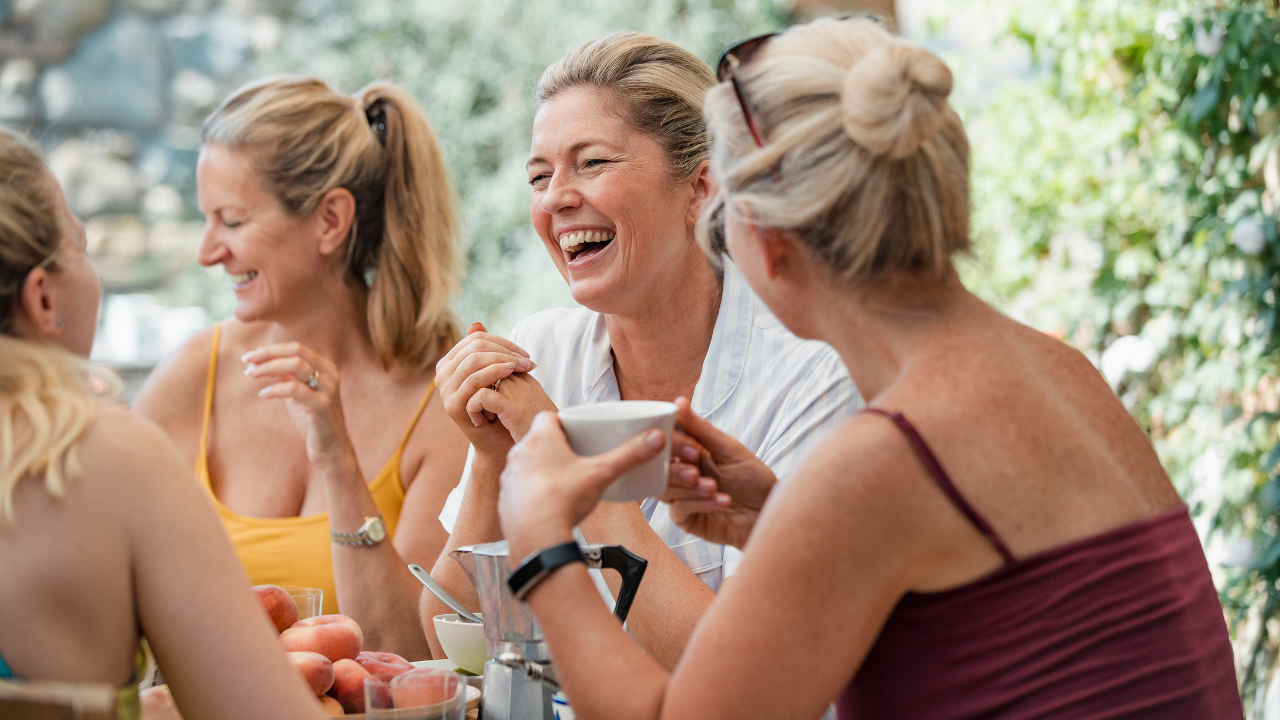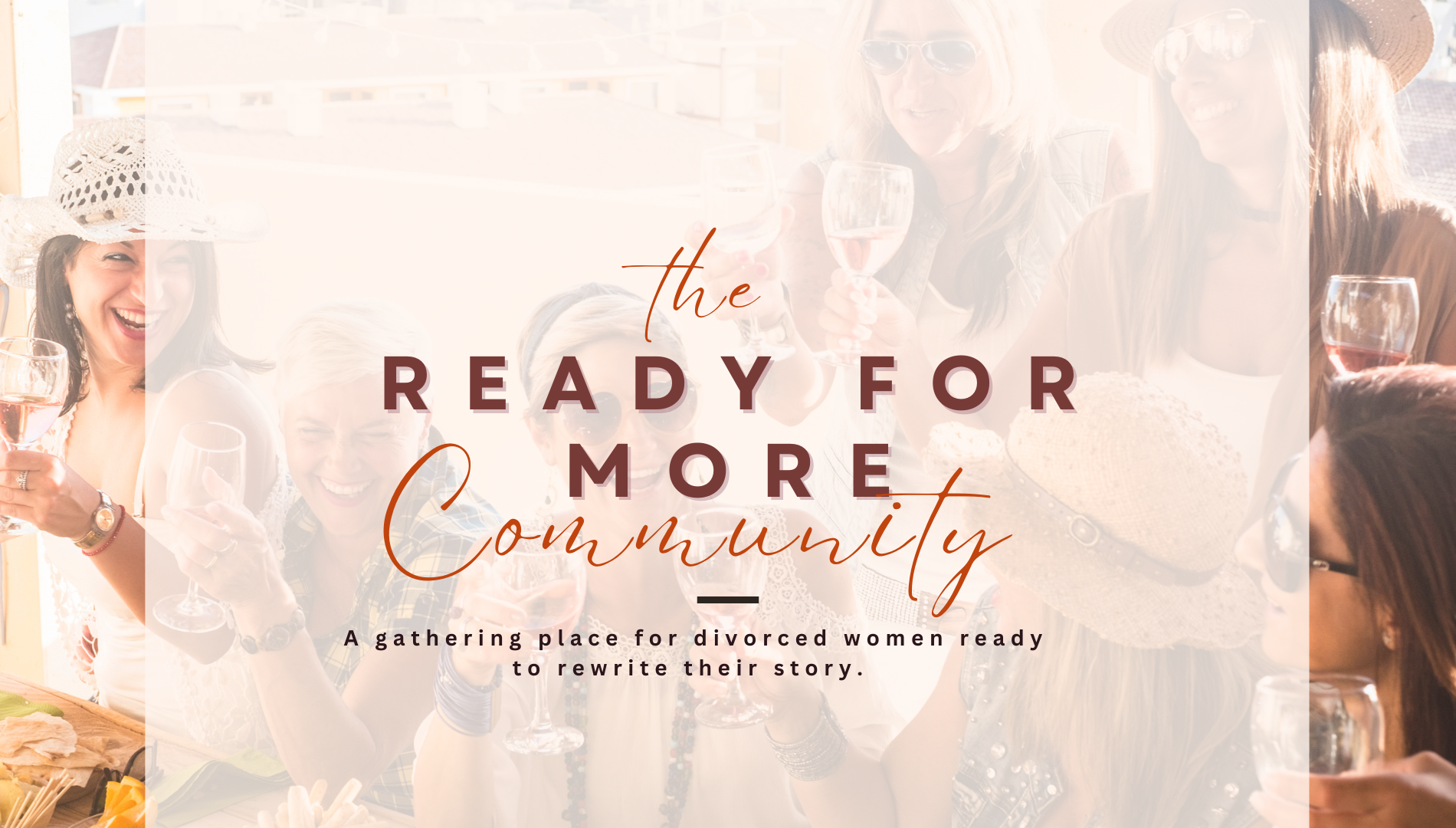The Power of Community After Divorce: Why You Don’t Have to Heal Alone

As a divorced woman, you’ve probably learned how to keep moving — even when everything around you feels like it’s falling apart. You make decisions alone now, manage things you never had to before, and hold steady for everyone else. You’re strong, capable, and resourceful — but you’re also human.
And here’s something we’ve seen again and again: even the most resilient women can’t rebuild their lives in isolation.
The Urge to Isolate and Become Hyper-Independent
You may recognize this pattern — you keep everything running, hold it all together, and stay busy enough not to feel how lonely or scared you really are. You take pride in being able to handle it all. And yet, somewhere deep down, you can feel it: you’re doing everything and still not really moving forward.
We see this all the time inside our private group conversations — women who are deeply capable, brilliant, organized, and exhausted. Women who will quietly suffer or push through one more hard thing rather than ask for help.
Here’s the part most people don’t talk about: that relentless independence you’ve built? It’s often a trauma response.
When you’ve been hurt, abandoned, dismissed, or betrayed, your nervous system learns that relying on others isn’t safe. You start to equate self-sufficiency with self-protection. You build walls, not because you want to be alone, but because you can’t risk being hurt again. So you say things like, I’ll never depend on anyone again. I’ll figure it out myself.
And you do. You are figuring it out — you’re surviving, getting things done, making life work. But survival isn’t the same as healing. Hyper-independence can keep you stuck in a quiet loop: doing, fixing, managing, proving. The motion is constant, but the progress feels minimal. You’re moving — but you’re not really moving forward.
And here’s where it gets tricky: not every woman feels safe yet. Safety isn’t just physical; it’s emotional, financial, and relational. Maybe your ex still feels unpredictable. Maybe you’re co-parenting with someone who pushes your boundaries. Maybe you’re financially stable but emotionally guarded. Safety exists on a spectrum, and for many women, it’s a slow journey — not a destination they’ve reached yet.
So if you’re reading this thinking, I want to connect, but I don’t feel ready, that’s okay. You’re not behind. You’re building your sense of safety one layer at a time.
The key is learning how to expand your capacity for connection without overwhelming your nervous system.
That might look like:
-
Letting yourself trust one safe person
-
Sharing one small truth instead of your whole story
-
Accepting a bit of help, even if it feels uncomfortable
Healthy independence doesn’t mean isolation. It means learning to rely on yourself and allowing the right people in. It’s a delicate balance — one that grows as you do.
When we talk about community, we’re not saying, “Depend on others to save you.” We’re saying, “Let others remind you that you’re safe now, that you belong, and that you don’t have to do this all alone anymore.”
No Community: The Silent Struggle
When you don’t have a true community after divorce, life can start to feel oddly quiet — and not the peaceful kind of quiet.
Maybe your married friends stopped calling because they don’t know what to say. Maybe your family tries, but they can’t really understand what it feels like to go home to an empty house or spend holidays divided in half. Or maybe you’ve just stopped reaching out because it feels like one more thing to manage.
At first, that isolation can even feel like control. You don’t have to explain yourself. You don’t have to answer questions. You don’t have to risk being met with judgment, pity, or well-meaning advice that lands wrong. You can just… be.
But over time, the silence gets heavy. The house feels too still. You start scrolling late at night, watching everyone else’s lives move forward, and that old whisper sneaks in: Everyone else is fine. Why aren’t I?
This is what we call the “quiet suffering” stage — when you’ve stopped falling apart, but you’re not yet rebuilding. You’re functioning. Working. Showing up. But inside, you feel invisible.
And this isn’t just emotional. Research shows that chronic loneliness can increase anxiety and depression by as much as 60%, and that social isolation has the same health impact as smoking 15 cigarettes a day. Our bodies literally read isolation as danger.
When you don’t have community, you lose your mirrors — the women who reflect your strength back to you, who remind you of what’s possible, who say, Yes, me too, in the moments you most need to hear it.
And we know how easy it is to slip into this stage without realizing it. You tell yourself you’re fine because you’re managing everything. You are — but at what cost?
No community means no soft place to land. And healing requires softness.
The Wrong Community: When Support Doesn’t Support
Not every space that calls itself “support” will actually help you heal.
You might find yourself in a Facebook group where every post is about what went wrong — the betrayals, the court battles, the endless frustration. Or maybe it’s a group of friends who love you but can’t stop bringing up your ex or reanalyzing the relationship. Sometimes, even a well-meaning therapist or coach can keep you circling the past instead of moving toward what’s next.
We’ve both been in those rooms. The conversations start with good intentions, but they can quietly become a loop — replaying what hurt instead of rebuilding what’s possible. You leave feeling validated, but not lighter. Seen, but not stronger.
Here’s the thing: healing doesn’t happen by staying safe inside your pain. It happens when you begin to open again — to people, to possibilities, to the full range of feelings that come with being alive.
Real healing asks you to take what you’ve learned and use it to live differently. To trust yourself more. To bring that hard-earned clarity into new experiences. And that’s not something you can do in a space that keeps you tethered to what broke you.
The wrong community will say, stay angry, stay guarded, stay safe.
The right one will remind you, you’ve earned your wisdom — now let’s use it to build something new.
When you’re surrounded by people who’ve walked the same road and found their footing again, it gives you perspective. You see what’s possible. You learn what worked for them and what didn’t. You absorb their courage almost by osmosis.
That’s the quiet gift of a healthy community — it becomes a living example that life after divorce isn’t about avoiding pain; it’s about expanding into the world again with more discernment, more confidence, and more compassion for yourself.
The Right Community: A Place to Land and Rise
There’s a noticeable shift when you find the right community. It’s almost physical. Your shoulders drop. You breathe a little deeper. You realize you don’t have to carry every single thing alone anymore.
It’s not a place where people tell you what to do or rush you to “get over it.” It’s a space where you can show up exactly as you are — tired, unsure, hopeful — and still be met with understanding.
The right community doesn’t just talk about healing; it helps you live it. You start seeing women who were once where you are — women who were scared to let go, scared to start over — now laughing again, creating new traditions, dating with boundaries, saying yes to things that scare and excite them. You begin to feel it in yourself too: the soft return of hope.
Inside a healthy community, growth feels less like a chore and more like a natural unfolding. You’re surrounded by stories that remind you what’s possible. You’re gently challenged to stretch, but you never feel pushed.
This is what real support looks like:
-
It gives you a place to rest and rebuild
-
It reminds you that your story isn’t over
-
It teaches you that asking for help is an act of strength, not weakness
-
And it holds you accountable to your own becoming
And something beautiful happens once you feel safe enough to stop surviving: you start to come back to life.
You laugh again — real, belly-deep laughter. You look around your home and notice how it finally feels like yours. You catch yourself daydreaming about what’s next instead of replaying what’s behind you.
That’s the point where healing shifts from theory to reality.
Because healing was never about staying safe or never hurting again. It’s about learning to trust yourself with your whole life — the joy, the risk, the love, the uncertainty — and knowing that this time, you have the tools and the people to navigate it differently.
That’s what the right community gives you: not protection from life, but the confidence to live it fully.
Why It Matters So Much
Divorce can make you forget who you are. It shakes your foundation, blurs your reflection, and leaves you wondering what parts of your old life you’ll carry forward and what you’ll leave behind.
And while so much of that work happens inside of you — the quiet decisions, the tears no one sees, the steady rebuilding — none of it happens in a vacuum. You weren’t meant to heal alone.
Community is what turns survival into growth. It’s what helps you see that you’re not broken, you’re becoming. It reminds you that being strong doesn’t mean being solitary — and that letting someone walk beside you doesn’t make you less capable, it makes you more human.
Because the truth is, life after divorce isn’t meant to be smaller, safer, or more controlled. It’s meant to be truer.
It’s meant to be filled with connection, laughter, lessons, risk, and renewal — all of it.
The right community gives you a foundation to stand on as you start living again. It offers a mirror for your strength and a hand for your next step. It’s where wisdom and belonging meet.
We’ve watched women come into community carrying the weight of their stories and slowly, steadily, begin to rise. They rediscover joy. They find new language for what they want. They build lives that finally fit.
That’s the impact of being surrounded by women who understand. You don’t just heal — you evolve.
Because while divorce may have been the end of one chapter, community helps you write the next one — not from who you were, but from who you’re becoming.
If you’ve been craving this kind of circle — one that feels safe, encouraging, and real — that’s exactly why we created the Ready for More Community.
It’s a space designed for women like you: smart, capable, done with surviving, and ready for something deeper. Inside, you’ll find honest conversations, thoughtful coaching, and other women who understand the in-between — that space where you’ve made it through the hardest part, but aren’t yet sure what comes next.
It’s not about starting over. It’s about starting from here — with all the wisdom, clarity, and experience you’ve earned.
When you’re ready, we’ll be here — holding space, cheering you on, and reminding you that moving forward doesn’t have to be lonely.
Because you were never meant to rebuild your life alone.
Mimi Sullivan and Carolyn Bilyak are the co-founders of ReBranding Divorce, a coaching and resource platform designed to help women move from heartbreak to healing to hope. Through courses, workshops, and their Ready for More Community, they’ve guided hundreds of women to rediscover who they are, rebuild confidence, and create lives that feel deeply their own.

